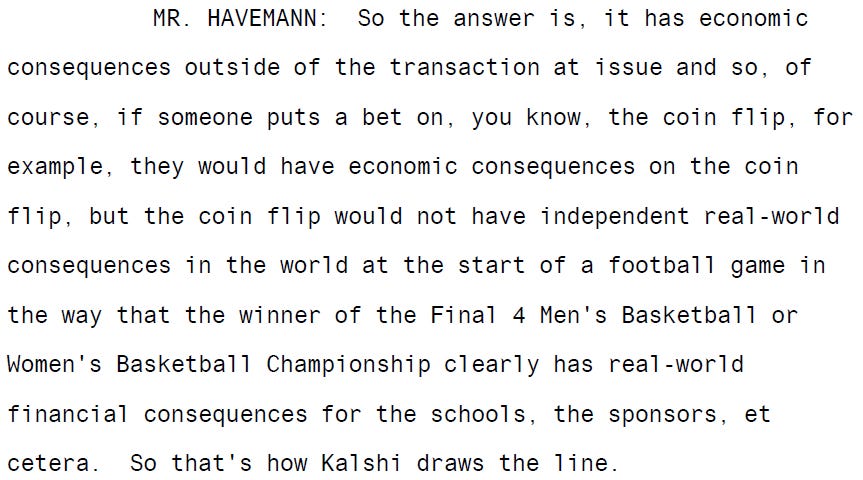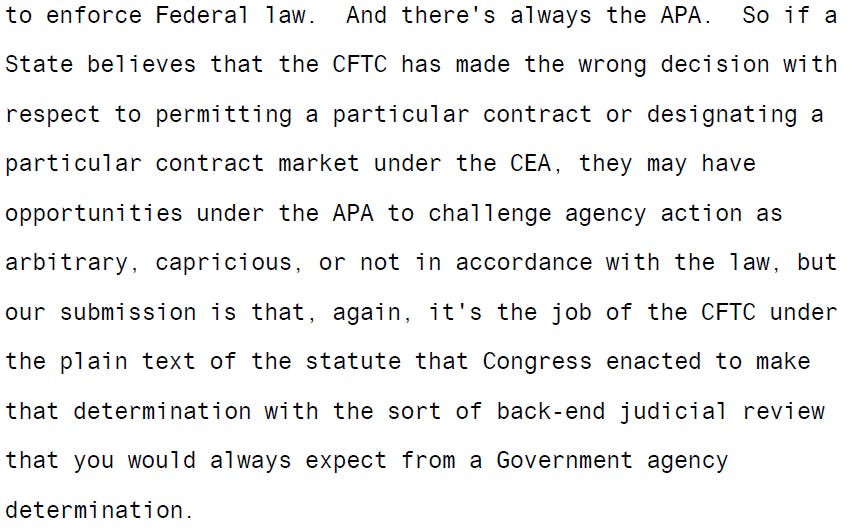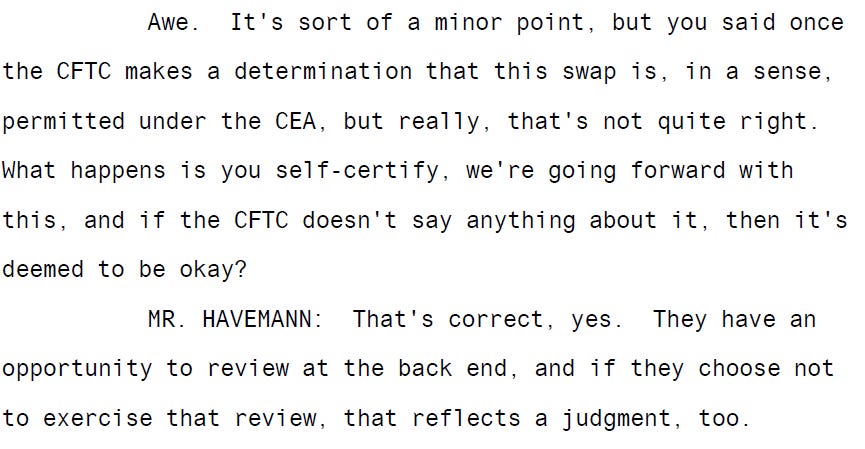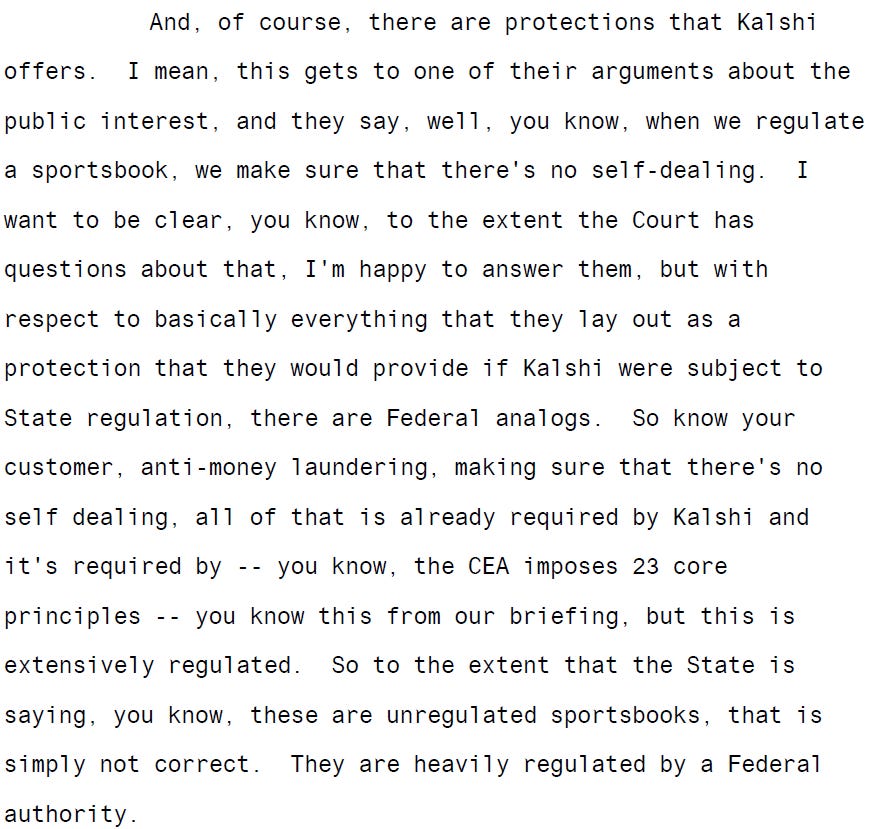The Current: Inside The Kalshi-Nevada Hearing's Oral Arguments
The Closing Line has seen the transcript of the hearing about the lawsuit from Kalshi as it argues it is not illegal sports betting. Here are five takeaways from that hearing from attorney Andrew Kim.
This is a guest post from Andrew Kim, a litigator at Goodwin Law. The normal gambling news roundup from Dustin Gouker follows the post.
When word got out about Kalshi’s preliminary-injunction win in Nevada, something didn’t add up. I was half expecting Kalshi to put up a “MISSION ACCOMPLISHED” banner, but Kalshi’s response was … muted. “On to the next step”? When we got the written order from Chief Judge Gordon, I was expecting to see something that would explain Kalshi’s measured enthusiasm. Nothing — the order’s very favorable for Kalshi.
Now that we have the hearing transcript, I see why Kalshi wasn’t publicly jumping for joy: Kalshi won a skirmish, not a battle. The judge still has lots of questions, and so do I. Here are my top five takeaways from the hearing, along with a few thoughts on where all of this is headed.
Takeaway #1: Nevada’s down, but not out for the count
Nothing in the written order suggested that Judge Gordon was open to changing his mind about the law. He wrote: “[B]ecause Kalshi is a CFTC-designated DCM [designated contract market], it is subject to the CFTC’s exclusive jurisdiction and state law is field preempted.” Zero equivocation in that sentence. Round one to Kalshi, I thought.
But if you read the transcript, it’s clear that we’re still in round one, and that Judge Gordon is being open-minded about the legal issues. Nat King Cole taught us how to spell L-O-V-E; Judge Gordon teaches us how to spell L-O-A-T-H-E:
And in case he wasn’t clear:
“... before I make a final determination on the legal issues.” Seems like the door’s still open for Nevada. Elsewhere, I laid out the arguments that Nevada left on the table; those arguments might still be in play.
(In fairness to all involved: temporary restraining order proceedings move fast, usually because they involve emergencies. You don’t really have time to make your best arguments — Nevada had only a week to pull together its response to Kalshi’s motion. And Nevada probably didn’t think it’d get sued, either; most operators that get a cease-and-desist letter from a state gaming regulator just pack up their bags, pull down their tent, and leave.)
The transcript also shows that Judge Gordon wants to be thoughtful about the real-world consequences here. He asked a lot about harm — harm to Kalshi, harm to Nevada’s interests — and decided that he probably needed more evidence to make a more informed call.
Takeaway #2: Judge Gordon wants this case to go away.
Every litigator’s seen some version of this speech:
I have no context clues for what was said during the “off-the-record discussion,” but my guess is that it went something like this:
///
THE COURT: Look, before we dive into a really ugly case with no clear answers, I just want to make sure you’ve thought long and hard about whether you can reach an agreement here. Kalshi, you rushed into court and sought a TRO immediately. Nevada, you put Kalshi in that pickle by not agreeing to hold off on enforcement while we sorted out the legal issues here. Can’t you all just go back to the drawing board and try to work this thing out?
NEVADA: Your Honor, we tried, and –
THE COURT: Did you really? “Get out of our state” isn’t really a compromise.
KALSHI: Your Honor, we’re certainly open to trying to work out a solution with the State [mostly because we need to figure out what to do with the five other cease-and-desist letters floating out there, and we don’t want to have to defend this front while dealing with the other States].
THE COURT: Well, that sounds good to me.
NEVADA: But Your Honor –
THE COURT: How about you check back in with me on April 30, let me know how things are going. Sounds good? Good. We’ll go back on the record.
///
(DISCLAIMER: All of that was made up, in case that wasn’t clear.)
But I’m not sure settlement talks will go anywhere. The problem for Nevada — and every other state gaming regulator out there — is a floodgates problem. How do you let Kalshi in, and no one else? On what terms would you let Kalshi operate? This is a purely legal issue that has massive economic consequences for the industry you regulate. You generally don’t settle those issues; you litigate or legislate.
Takeaway #3: What’s the line? (Between event contracts and sports wagers, not the money line, degenerates.)
Judges like neat little boxes, and they like clear rules. Judge Gordon asked the same question we’ve all been asking: how do you tell the difference between a “sports-related event contract” and a sports bet or wager?
Of course, Kalshi’s lawyer has an answer:
Sounds nice in theory, right? Judge Gordon sounds a little skeptical.
Well-armed, Kalshi’s lawyer has a response:
Oh, and for good measure:
I’ll resist the temptation for snark here.
Here’s my problem with this argument: it’s not really a workable rule. Sure, Rory McIlroy winning the Masters has financial consequences: he wins just over $4 million. But what about a meaningless, late-season NBA game? If your answer to that is, “well, if the team loses, gets the worst record in the league, guarantees a top five draft pick, drafts a player that brings in more interest and revenue to the team,” that’s not an answer at all.
Or, take the example Steve Brubaker is fond of using: slots. A slot pull arguably has “economic consequences”: if the RNG hits the right way, the slot player might win a progressive.
Takeaway #4: Is Kalshi going for ‘heads I win, tails you lose’?
Kalshi’s argument to Nevada is “you can’t regulate us; if you don’t like what we’re doing, go sue the CFTC.”
But I don’t think a state is actually able to sue, in part because of how the CFTC makes its “decisions.” Judge Gordon caught onto some of this, but I don’t think he understood the significance of it:
In other words, to approve a contract, the CFTC does … nothing.
Here’s why a state might not be able to sue because of that. (This gets technical, so bear with me here.)
Under the federal Administrative Procedure Act, a person “adversely affected or aggrieved” by an AGENCY ACTION can challenge that action on certain legal grounds.
I all-capped, bolded, and italicized “AGENCY ACTION” because it’s a key requirement of the Administrative Procedure Act. And you don’t need to be a lawyer to know that a federal agency doing nothing may not be, well, “action.”
Of course, nothing is that easy. Federal law also defines “agency action” as including a “failure to act.” Nevada’s good to go, right? Well, again, nothing is that easy. Back in 2004, the Supreme Court said you can only sue about a failure to act if an “agency failed to take a discrete agency action that it is required to take.”
And, according to Kalshi’s lawyer, the CFTC isn’t required to do anything:
Later on in the hearing, he says:
So, when Kalshi’s lawyer says, “Nevada can go sue the CFTC,” it’s not that easy, if it’s possible at all.
To be sure, there may be lots of things that the CFTC does with respect to sports-related event contracts that Nevada may be able to challenge in court someday. But I don’t think one of those things is the CFTC doing nothing about a “gaming” contract that Nevada says is “contrary to the public interest.”
Takeaway #5: Regulation isn’t interchangeable.
During the hearing, Kalshi made a big deal about the fact that designated contract markets are tightly regulated by the CFTC. The technical term for this argument is the “we’re not a bunch of lawless bandits” argument. (It isn’t; I just made that up.)
This is a clever move by Kalshi’s lawyer: he’s trying to make it sound as if the CFTC is covering a lot of the same ground that a state gaming regulator would. There’s some really great advocacy here, using buzzwords that are familiar in a gaming state. KYC. AML.
But I don’t think it’s fair to imply that the regulation of swaps looks a lot like the regulation of sports wagering. KYC and AML are just the tip of the iceberg. What about responsible gaming (and self-exclusion)? Integrity monitoring? Comparing derivatives regulation to gaming regulation has some superficial appeal, but regulation isn’t interchangeable. There’s a reason that states have spent years—decades, even—carefully crafting regulations that meet the unique challenges of the sports wagering ecosystem. The same for the CFTC and its regulation of exchanges.
Some final thoughts
I wanted this post to end with some deep, meaningful insight into the bigger legal issues at play. The truth is, I don’t have one. What Kalshi’s Nevada hearing reveals is that there are lots of different layers and issues that are all mixed together here: state gaming regulation, federal derivatives regulation, consumer protection, and constitutional questions (federalism), to name just a few. Oh, and we haven’t even talked about IGRA. (A preview of that here.) This is a multi-front campaign involving, at the very least, state gaming regulators, the CFTC, courts, and possibly the tribes, sports betting operators, and the leagues.
And what makes things especially hard is that no one is an expert on all of these issues. I think that’s why Nevada found itself a bit flat-footed at the jump. To Nevada, state-regulated gaming and gambling is the center of the universe. To Nevada regulators, it’s unthinkable that sports-related event contracts are anything other than a ruse for sports wagering.
(For what it’s worth, I don’t profess to be an expert in everything, either. I’m a Supreme Court litigator who just happens to enjoy gaming and gambling… and gaming and gambling law, too. I’ve had a crash course on derivatives law in the last few weeks, and I certainly don’t know all the complexities there.)
What’s unfolding now is the latest episode of legal disruption being used to achieve market disruption. My sense is that, by waging a legal fight in a place that’s no one’s comfort zone, Kalshi is hoping to shape (or reshape) the law in a way that will let it reshape an industry. I think states are keenly aware of the stakes for them and the operators they regulate. But I don’t think anyone fully understands just how massive, and how disruptive, this fight might become. Maybe not even Kalshi.
And if you’re tired of reading about the legal issues surrounding prediction markets, this might sum up how you feel:
Andrew is a litigator at Goodwin Law and is an expert on issues relating to appellate litigation, federal-court practice, federal administrative law, and gaming and gambling law. He represents clients before the U.S. Supreme Court, federal and state courts of appeals, and regulatory bodies, including state gaming commissions, state attorneys general, the CFPB, and the SEC. Andrew also advises clients in the gaming and gambling space, particularly on emerging legal issues, like what we're seeing with prediction markets now. If you're interested in a deep-dive on the legal issues surrounding prediction markets, follow him on LinkedIn.
Gambling news roundup
North Carolina Senate proposes doubling sports betting tax (SBC Americas): Currently, sportsbooks in the country’s newest active online sports wagering market pay 18% of their gross revenue in tax. The incumbent Republicans want to double that to 36%. That would put North Carolina behind only New York (51%), New Hampshire (51%) and Delaware (50%) and level with Pennsylvania in terms of flat sports betting tax rates.
I am begging policymakers to read the room and realize that there’s a possibility of nationwide sports betting platforms that pay a 0% tax to your state. Making it harder for regulated sportsbooks to do business in the current environment is not what you should be doing.
Closing Line Consulting
Niche research and analysis? Startup advice? Help with your content? I have a consultancy to help clients in gaming and beyond. Learn more about CLC here.
Want to be a sponsor of this newsletter? Email dustin@closinglineconsulting.com.
Ex-official facing penalties after engaging in sports betting while at Baylor, including events involving university teams (KWTX): “Sam Hancock, the former director of resource development at Baylor University is facing penalties after engaging in sports betting activities while at Baylor, including placing bets on events involving Baylor teams and student athletes, the NCAA said. Hancock placed “impermissible” daily fantasy bets on professional and collegiate games from July 2019 through September 2024, including competitions involving Baylor teams, according to NCAA. In total, he placed 2,950 impermissible bets totaling $45,979 on three different sports betting platforms.”
This is the second time we’ve seen something like this of late in the college ranks involving activity in daily fantasy sports. Players using fantasy pick’em apps is a part of an investigation and suspensions around Fresno State’s men’s college basketball team.
McKennie among 13 players named in illegal gambling probe - reports (ESPN): “United States midfielder Weston McKennie is among 13 soccer players being investigated for illegal online betting in Italy, according to widespread media reports. A new investigation by Milan prosecutors stems from evidence given by Sandro Tonali and Nicolo Fagioli in 2023. Both then served lengthy bans, ruling them out for most of last season, after agreeing to plea bargains that also included therapy for a gambling addiction.”
Are prediction markets gambling? Robinhood CEO Vlad Tenev is betting not (The Verge): “Tenev and I really dug into some of the complexity around these ideas. For example, you’ll hear him say he thinks of prediction markets as “the news faster” and that there is a meaningful difference between a prediction market guessing if the Lakers will win their next game and just simply placing a bet on DraftKings or FanDuel for the same outcome. You’ll hear him say that prediction markets communicate unique information that reflects reality, rather than just a dressed-up version of gambling that mostly reflects how people feel.”
This is actually an interesting and nuanced discussion on prediction markets and sports event trading that I recommend reading. But yeah, I don’t really agree that there’s a huge delta between betting on Robinhood and betting on FanDuel.
Kalshi Launches Single-Game NBA Moneyline Betting (The Event Horizon): “NBA moneyline betting is now in 50 states. Prediction market Kalshi listed four markets for the play-in tournament for the NBA postseason on Monday afternoon. It’s the first time Kalshi has offered single-game NBA markets.”
As we keep looking for signs of how far “sports event trading” is going to go via prediction markets, this is a signal that we’re going to see more moneyline markets. If the lid is off, we will almost certainly see baseball and hockey soon, and football single-game markets in the fall? The big question remains if Kalshi (and Crypto.com, and others?) start wading into other markets that sportsbooks typically offer (spreads, props, parlays, etc.).
Interesting to note that Robinhood does not currently offer these markets (at least on my app). If you see them populate there, please let me know. Robinhood did have college basketball and The Masters.
ESPN BET And ESPN Deepen App Integration With ‘Mint Club’ (Casino Reports): “ESPN BET and ESPN announced the creation of “Mint Club” on Tuesday, offering accountholders of the mobile sportsbook who also have ESPN accounts a more personalized sports betting experience. The most notable feature of Mint Club is the enhanced bet tracking available on the ESPN app. Members will be able to track their online sports wagers on the Scores section of the ESPN app, including upcoming bets and progress on parlay wagers.”
I mean this sounds interesting. But for a brand and sportsbook that need needle-moving developments to increase their market share, this isn’t something that would seem to materially impact that. While this might help with retention and per-user revenue, I don’t think it helps much with ESPN Bet’s core problem, which is customer acquisition.






















